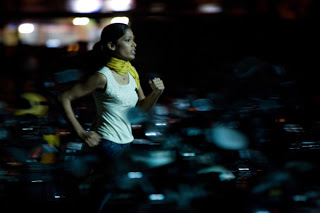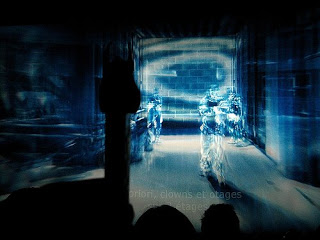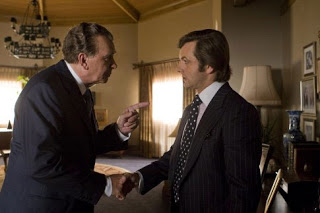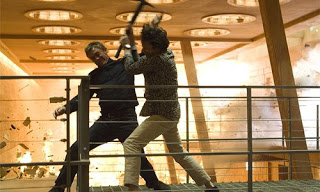Editing may officially be viewed as a technical category, but it’s an important one. Two of a movie’s most important characteristics – namely clarity (can viewers clearly comprehend the on-screen proceedings?) and pace (are those proceedings taking place at a brisk but unhurried clip?) – are directly related to the quality of the editing. Nominations for Best Picture and Best Editing tend to coincide, and with good reason: Editing, like Ron Burgundy, is kind of a big deal.
NOMINEES
The Curious Case of Benjamin Button – Kirk Baxter, Angus Wall
The Dark Knight – Lee Smith
Frost/Nixon – Mike Hill, Daniel P. Hanley
Milk – Elliot Graham Slumdog
Millionaire – Chris Dickens
WILL WIN
It’s interesting that this quintet comprises what were the initial favorites for Best Picture going into the nominations, with The Dark Knight replacing The Reader. Since the superhero receives special acknowledgement here, the category seems to be a race between The Dark Knight and Slumdog Millionaire, with the latter acting as the Best Picture frontrunner (at least for the moment). The Curious Case of Benjamin Button is building some overall momentum, but at nearly three hours it’s too long to contend for an editing Oscar, while voters will likely appreciate Frost/Nixon and Milk more for their acting and historical relevance.
So it’s the billionaire Prince of Gotham facing off against the scrapper from the streets of Mumbai. It’s tempting to side with the Best Picture favorite here, but the historical record suggests otherwise. In the past 10 years, only four Best Picture winners have also captured the editing prize (Chicago, The Lord of the Rings: The Return of the King, Crash, and The Departed – for what it’s worth, Chicago was the only one that deserved it). Also, last year’s winner The Bourne Ultimatum was an actioner, which bodes well for The Dark Knight (the movie defies typical genre classification, but it certainly has its share of action). So The Dark Knight seems like the canny pick.
But I can’t go with it, mainly because I give the Academy too much credit – some of the editing in the final act of The Dark Knight is incredibly sloppy (more on this in a bit), and I think voters will be turned off. Slumdog Millionaire, in contrast, is an editor’s wet dream. It’s loaded with all of the classic gimmicks: flashbacks and flash-forwards, high-speed montages and slow-motion sequences, rapid cutting and long unbroken takes, all synched to a kickass score. Hell, even the subtitles are implemented with flair. Throw in the intermittent clumsiness of The Dark Knight, and Slumdog Millionaire takes it.
(By the way, you know how I mentioned the “historical record”? Well, the historical record also indicates that I’m going to get this wrong. In the past five years, I’ve predicted the correct winner for Best Editing exactly once. For this category, I’m more inaccurate than Baron Davis.)
SHOULD WIN
O.K., I’m a huge fan of The Dark Knight and am disappointed it didn’t earn a Best Picture nomination, but it really has no business in this category, and here’s why: Remember that sequence near the end of the movie where Batman breaks into the building where The Joker has a bunch of people being held hostage by bad guys, only the people who look like hostages are actually the bad guys and vice-versa, and Batman uses some crazy sonar-inspired device he spent $30 billion of his own money on by bugging every cell phone in Gotham in order to track The Joker’s whereabouts, and when he activates it everything appears in this trippy neon-blue night-vision while Morgan Freeman whispers warnings in his ear like an assistance module in a videogame? What the fuck was going on there? It was completely incoherent. I saw The Dark Knight three times in theatres, and each time that sequence confused the hell out of me. I understand the impressively creepy ethical question (essentially, is it justified for a hero to invade the privacy of the people he’s trying to protect?), but the actual execution of that scene was very poor, and much of the blame falls on the editor.
All of the remaining candidates are commendable, although I can’t look back on Milk and say I was wowed by its editing. I don’t want to dismiss Benjamin Button out of hand because of its length, as it features some wonderfully complex cinematic moments, and the editing of the Accident scene is impeccable. That said, its pace, while by no means slow, was indeed a bit languid.
The editing of Slumdog Millionaire was generally fantastic, but I’m actually going to throw my support to Mike Hill and Daniel P. Hanley for their magnificent work on Frost/Nixon. Here’s a movie that consists almost entirely of dialogue yet is somehow utterly gripping. Even though we already know the ending (even if you’re ignorant of the history, all you have to do is watch the fucking trailer, which conveniently reveals the climactic scene), the film is remarkably suspenseful – honestly, when I watched it, I felt like I was watching an action movie. The final interview between the title characters is absolutely electric. Frost/Nixon has no chance of securing an editing Oscar, but that doesn’t mean it doesn’t deserve one.
DESERVING
Gran Torino. The story in Clint Eastwood’s latest film may be a bit melodramatic, but there isn’t a wasted moment in this richly rewarding tale of redemption. The pacing is utterly perfect, and Joel Cox’s and Gary Roach’s cutting is sparse and in no way distracts from the lovely simplicity of the story.
Changeling. A completely different Eastwood movie, this one builds suspense and intrigue before allowing itself a lengthy exhale in its denouement. Cox and Roach collaborate on editing again, and again they convey as much information as necessary with clarity and precision.
The Bank Job. Roger Donaldson’s true-crime story chronicles a number of different characters, and editor John Gilbert – who edited the first Lord of the Rings picture – helps us keep them all straight and also keeps the complicated proceedings bustling along at a steady clip.
Wall-E. Obviously.
NOT DESERVING
Quantum of Solace. I put this on here with a heavy heart. I liked Quantum of Solace quite a bit, and it could have joined Casino Royale as an elite Bond movie, but most of the action scenes are edited with such hyperactive freneticism that they’re practically impossible to follow. Shame.
Jeremy Beck is the editor-in-chief of MovieManifesto. He watches more movies and television than he probably should.





A lot of your analysis figures historical data into predicting Oscar winners from the nominees. We should combine powers; you tell me what trends are important and I’ll write a constraint program to figure out who’ll win this year.
Not a bad idea (what’s a constraint program?), although it would have been better 10 years ago. I feel like whereas in the past the Academy tended to follow formula very closely, they’ve become more unpredictable over the past decade or so. It started with “Shakespeare in Love” over “Saving Private Ryan” in ’98, and then of course “Crash” winning in ’05 was a total shock. Plus, some of their acting choices (Adrien Brody for “The Pianist”, Tilda Swinton for “Michael Clayton”) have been real surprises.
This may explain why my predictions over the past few years have been somewhat less than stellar. Then again, “Dark Knight” is probably the trendier pick this year for Editing, so perhaps I’m going against the grain, at least in this category.